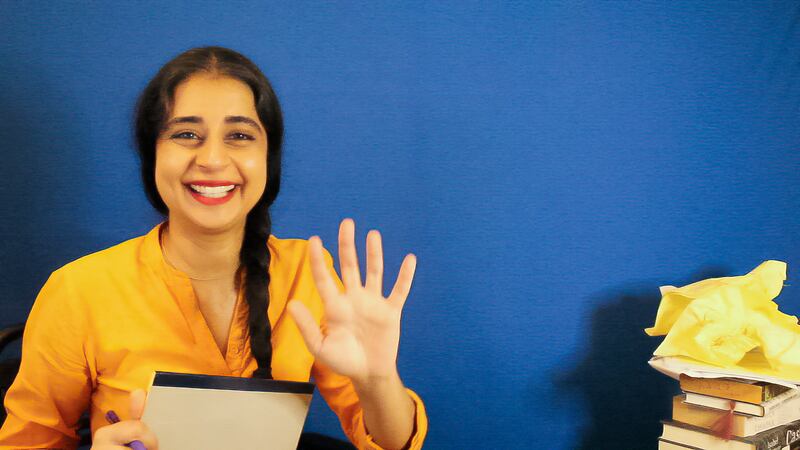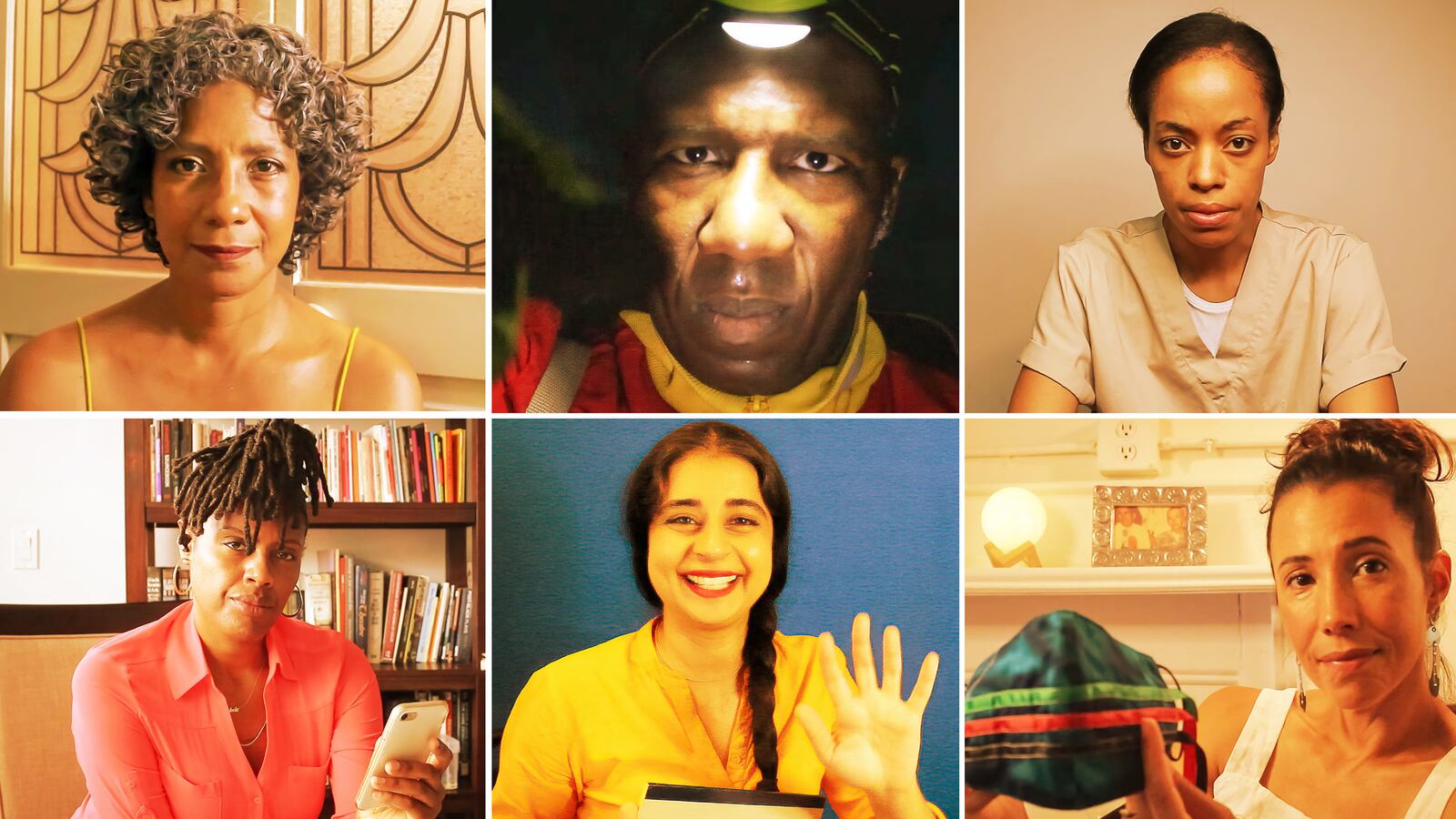Theatre for One: Here We Are boils drama down to essentials: one viewer, one actor, and a visceral live-wire connection that manages to transcend physical space.
Presented by Arts Brookfield and billed as a digital theatrical experience, the eight micro-plays burn fast and bright, pairing one performer with one audience member for a live two-way video call.
Written, performed, and directed by Black, indigenous, and other racial minority women artists, Theatre for One connects viewers screen-to-screen with characters whose stories are reflected among ongoing global calls for racial justice.
Viewers are first instructed to enter a 10-digit code on the website’s landing page at an arranged time. After a quick camera and mic check, Theatre for One assumes control of the full screen. Patrons can sign up for multiple time slots to see more than one play, but each one is meant to stand alone. Viewers are paired with one of the plays at random, the whole experience running about 15 minutes.
Taut, vivid, and charged with feeling, the encounters provoke and linger long afterward.
Created by co-artistic directors Christine Jones and Jenny Koons, Theatre for One was initially conceived in 2002 as an in-person performance. But the new iteration is theatre for our times on every front.
The plays’ brevity mercifully concedes to our fractured attention spans. (Insert pause to scroll for news, another if you find breathing into a paper bag at all helpful.) The one-on-one format offers a rare moment of genuine connection with a stranger in strange times, brief enough that it doesn’t feel awkward.
Theatre for One meets us where we are—thankfully without asking us to squeeze in one more Zoom call while denying us the dignity of at least being invited to participate. In fact, viewers were told in advance that we would be seen and heard. So for the first time in a few days, I put on a proper shirt with buttons and sat back down in front of my laptop. In another world, I’d have been dashing out the door, across town, and into an assigned seat before curtain.
“You’re right where you need to be,” came the white text across my blank screen. I nodded, to whom I’m not sure.
The waiting room before and between plays is a black screen where viewers are invited to “make your presence known” through a chat submission box across the bottom.
A small constellation of “Hello”s and “hi there”s rose up in white and faded away. “What thoughts do you bring with you everywhere you go?” came one prompt, presumably from our unseen host. “What have you learned during this time?” Responses were honest and surprisingly vulnerable, anonymous confessions in the dark.
My first play took over the screen: a young woman seated against a wall of deep-sea blue, a pile of books to one side, topped with a crumpled sheet from the notepad in her hand. She invited me to respond in a brief back-and-forth greeting; then I sat quietly as she told me about the letter she was writing to the late John Lewis.

Mahira Kakkar in 'Thank You Letter'
Courtesy of PANDEMIC FIGHTThe play, I learned in the closing credits, is called Thank You Letter, by Jaclyn Backhaus, directed by Candis C. Jones, and created and performed by Mahira Kakkar.
Her maternal grandparents had emigrated to the states illegally from India in 1917, she told me, farmers unable to vote, unlikely Panjabi pioneers. Her family had Lewis to thank for helping to pass the Immigration and Nationality Act of 1965, which welcomed subsequent generations to call America home.
Her eyes brimmed and already our time was almost up, but I had to tell her: My family has Lewis to thank as well, I said. Just a decade after that bill opened the doors, my parents and their siblings walked through them from India, too.
I’m not sure she’d expected to receive a response, much less the one I gave, and we held each other’s gaze for an uncanny moment. It was the closest I’ve ever felt to a performer, and to a writer’s story, in the same room or otherwise. She said she was going to call her mom, then she was gone. I reached for my phone to see who’d texted me during the play. I should have guessed it was my own mother—how do they do it?
The closing screen asked me to share a lasting impression, snapped my photo with the laptop camera, and posted both to a scrolling gallery with other viewers’ responses, as though we were milling in a virtual lobby.
I wanted to grab someone and tell them about the connection I’d felt, one I’d never have experienced had anyone else been there. On this digital frontier, the rules of theatrical engagement felt inverted: It was isolation and physical separation, rather than any sense of collective presence, that had made the scene so electric.
Back in the waiting room, more disembodied admissions floated and faded: “I’ve embraced self-kindness and stopped pushing myself so hard,” one read. “Same here,” I typed.
Then I was facing a cozy kitchen corner, light pouring through a plant-strewn window across walls covered in children’s drawings. Created and performed by Eisa Davis, the play I would learn afterward, is called What Are the Things I Need to Remember, written by Pulitzer-winner Lynn Nottage, directed by Tiffany Nicole Greene.
Every day, the woman (a mother, I gathered from the drawings) writes down a different memory, she told me. Today, it was Naima: an “alternative Black chick” back in high school with an “I don’t give a shit I’m a bad ass bitch vibe” (already, I was hooked).
When Naima asked her, a more low-key (read: less cool) Brooklyn girl, to hang out, she was shocked but excited. They had, what Nottage describes in sensuous and specific detail, a quintessential New York afternoon in Central Park. Cold iced teas, knishes, a DJ spinning at the bandshell.
I wanted nothing more than to beam back in imaginary time and join them, jostling through a sweaty, dancing crowd (remember dancing?). Then evening fell, and her story took a sharp, dark turn. “What happened to Naima?” I wanted to ask, suddenly feeling shy. Did she really never see her after that night?
Before I could open my mouth to speak, the screen went white. I was alone again.
Theatre for One: Here We Are runs Thursdays, September 10, 14, and 24, 2020. Free tickets are released Monday before each show.







